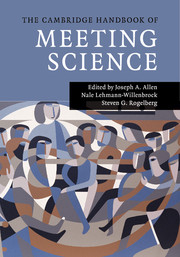Book contents
- The Cambridge Handbook of Meeting Science
- The Cambridge Handbook of Meeting Science
- Copyright page
- Dedication
- Contents
- Tables
- Figures
- Contributors
- Book part
- Part I Introduction
- Part II Premeeting Activities and Context
- Part III The Meeting Itself
- Capturing and Understanding Dynamics and Processes of the Meeting
- 12 Meetings as Interactional Achievements
- 13 Multimodal Perspectives on Meeting Interaction
- 14 Toward a Theory of Strategic Meeting Interaction
- 15 Social Dynamics at Work
- 16 Networks in Meetings
- 17 Effective Leader Behaviors in Regularly Held Staff Meetings
- 18 They Meet, They Talk…but Nothing Changes
- 19 Relative Status and Emotion Regulation in Workplace Meetings
- 20 Dynamic Affect in Team Meetings
- Tools and Models for Promoting Meeting Success
- Part IV Special Types of Meetings
- Part V Synthesis and Conclusion
- Book part
- Author Index
- Subject Index
- References
14 - Toward a Theory of Strategic Meeting Interaction
from Capturing and Understanding Dynamics and Processes of the Meeting
Published online by Cambridge University Press: 05 August 2015
- The Cambridge Handbook of Meeting Science
- The Cambridge Handbook of Meeting Science
- Copyright page
- Dedication
- Contents
- Tables
- Figures
- Contributors
- Book part
- Part I Introduction
- Part II Premeeting Activities and Context
- Part III The Meeting Itself
- Capturing and Understanding Dynamics and Processes of the Meeting
- 12 Meetings as Interactional Achievements
- 13 Multimodal Perspectives on Meeting Interaction
- 14 Toward a Theory of Strategic Meeting Interaction
- 15 Social Dynamics at Work
- 16 Networks in Meetings
- 17 Effective Leader Behaviors in Regularly Held Staff Meetings
- 18 They Meet, They Talk…but Nothing Changes
- 19 Relative Status and Emotion Regulation in Workplace Meetings
- 20 Dynamic Affect in Team Meetings
- Tools and Models for Promoting Meeting Success
- Part IV Special Types of Meetings
- Part V Synthesis and Conclusion
- Book part
- Author Index
- Subject Index
- References
Summary
Organizations are increasingly reliant on meetings to disseminate their vision, make decisions, and coordinate responses to societal and organizational demands (Rogelberg, Scott, & Kello, 2007). This chapter applies a communicative perspective to meetings, which promotes a process-based approach to meeting interaction. After reviewing the interdisciplinary literature on meeting interaction, we offer propositions about meeting communication as a starting point for a theory of strategic meeting interaction. Building from the work of Kellerman (1992) and Beck and Keyton (2009), we emphasize the importance of viewing meeting interaction as inherently strategic. Specifically, we argue that all meeting interaction is strategic, and this premise is the foundation for meaning creation and contextual influence in meetings. This perspective encourages researchers to view interaction messages as the evidence of meeting member goals and to recognize the importance of process for understanding the relationship between inputs and outputs. We conclude by providing methodological considerations for the propositions, along with an example study using this perspective.
- Type
- Chapter
- Information
- The Cambridge Handbook of Meeting Science , pp. 305 - 324Publisher: Cambridge University PressPrint publication year: 2015
References
- 5
- Cited by

